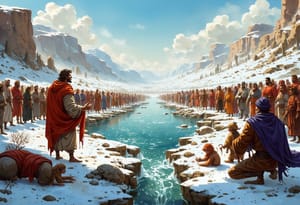| Series | The Gospel of Luke |
|---|---|
| Theme | 1. The ministry begins - Ua amata le galuega tala'i |
| Colour | Lanu Auro |
Scripture Focus: Luka 3:1-22
Now in the fifteenth year of the reign of Tiberius Caesar, Pontius Pilate being governor of Judea, and Herod being tetrarch of Galilee, and his brother Philip tetrarch of the region of Ituraea and Trachonitis, and Lysanias tetrarch of Abilene, in the high priesthood of Annas and Caiaphas, the word of God came to John, the son of Zacharias, in the wilderness. He came into all the region around the Jordan, preaching the baptism of repentance for remission of sins. As it is written in the book of the words of Isaiah the prophet, “The voice of one crying in the wilderness, ‘Make ready the way of the Lord. Make his paths straight. Every valley will be filled. Every mountain and hill will be brought low. The crooked will become straight, and the rough ways smooth. All flesh will see God’s salvation.’” He said therefore to the multitudes who went out to be baptized by him, “You offspring of vipers, who warned you to flee from the wrath to come? Therefore produce fruits worthy of repentance, and don’t begin to say among yourselves, ‘We have Abraham for our father;’ for I tell you that God is able to raise up children to Abraham from these stones! Even now the ax also lies at the root of the trees. Every tree therefore that doesn’t produce good fruit is cut down, and thrown into the fire.” The multitudes asked him, “What then must we do?” He answered them, “He who has two coats, let him give to him who has none. He who has food, let him do likewise.” Tax collectors also came to be baptized, and they said to him, “Teacher, what must we do?” He said to them, “Collect no more than that which is appointed to you.” Soldiers also asked him, saying, “What about us? What must we do?” He said to them, “Extort from no one by violence, neither accuse anyone wrongfully. Be content with your wages.” As the people were in expectation, and all men reasoned in their hearts concerning John, whether perhaps he was the Christ, John answered them all, “I indeed baptize you with water, but he comes who is mightier than I, the strap of whose sandals I am not worthy to loosen. He will baptize you in the Holy Spirit and fire, whose fan is in his hand, and he will thoroughly cleanse his threshing floor, and will gather the wheat into his barn; but he will burn up the chaff with unquenchable fire.” Then with many other exhortations he preached good news to the people, but Herod the tetrarch, being reproved by him for Herodias, his brother’s wife, and for all the evil things which Herod had done, added this also to them all, that he shut up John in prison. Now when all the people were baptized, Jesus also had been baptized, and was praying. The sky was opened, and the Holy Spirit descended in a bodily form as a dove on him; and a voice came out of the sky, saying “You are my beloved Son. In you I am well pleased.”
- Luke 3:1-22 (WEB)
Study:
Luke chapter 3 sets the stage for Jesus' public ministry by focusing on the work of John the Baptist. This passage is meticulously detailed in its historical context, establishing the political and religious landscape of the time. John’s message is a call to repentance and preparation for the coming Messiah. He doesn't offer a superficial religious experience, but demands a tangible change in behavior, evidenced by “fruits worthy of repentance.” He challenges the people's reliance on their lineage (“We have Abraham for our father”) and emphasizes the need for genuine transformation. The response to John’s preaching is diverse, with people from all walks of life – the general populace, tax collectors, and soldiers – seeking guidance. John’s responses are specific and tailored to their respective situations, highlighting the personal responsibility each individual has in preparing for the Lord. The passage culminates in Jesus' baptism, marking the official beginning of his ministry, and the divine affirmation of his sonship.
Application:
John the Baptist’s message of repentance is just as relevant today. We often get caught up in external displays of religiosity, but God desires a change of heart that manifests in our actions. Are we truly examining our lives and seeking to align them with God's will? The passage challenges us to look beyond our heritage or position and focus on demonstrating genuine faith through practical acts of kindness, justice, and integrity. Like the people who came to John, we too need to consider how we can live out our faith in our daily lives, whether in our careers, relationships, or communities.
Reflection Questions:
- What areas of your life need repentance?
- Are you relying on past blessings or external factors instead of a genuine relationship with God?
- How can you practically demonstrate your faith in your everyday life?
- What “fruits” are you producing in your life? Are they aligned with God’s will?
- How does the baptism of Jesus inspire you to live a life of obedience and surrender?
Prayer:
Heavenly Father, search my heart and reveal any areas where I need to repent. Help me to produce fruits worthy of repentance and to live a life that is pleasing to You. Thank You for the example of John the Baptist and the perfect obedience of Your Son, Jesus. In Jesus’ name, Amen.
Tags:Luke, John the Baptist, Repentance, Baptism, Ministry of Jesus, Preparation, The Gospel, Transformation, Faith, Fruits of Faith
